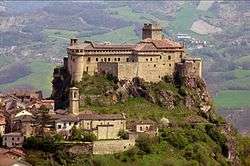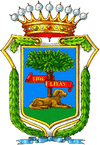Bardi, Emilia-Romagna
| Bardi | ||
|---|---|---|
| Comune | ||
| Comune di Bardi | ||
|
The Castle of Bardi | ||
| ||
 Bardi Location of Bardi in Italy | ||
| Coordinates: 44°38′N 9°44′E / 44.633°N 9.733°E | ||
| Country | Italy | |
| Region | Emilia-Romagna | |
| Province / Metropolitan city | Parma (PR) | |
| Frazioni | Assirati, Bazzini, Bergazzi, Berlini, Bertonazzi, Boccolo, Bosini, Bre, Brugnoli, Caberra, Cacrovoli, Caneto, Cantiga, Caprile, Carpana, Casanova, Case Ini, Case Soprane, Cavallare, Cerreto, Chiesabianca, Cogno, Credarola, Cogno Grezzo, Comune Soprano, Costa, Cremadasca, Diamanti, Dorbora, Faccini, Faggio, Fantoni, Ferrari, Filippini, Franchini, Frassineto, Gabriellini, Gazzo, Geminiano, Granelli, Granere, Gravago, Grezzo, Lezzara, Lobbie, Moglie, Monastero, Noveglia, Osacca, Panigaro, Pareto, Piana Gazzo, Pianelletto, Pieve, Pione, Ponteceno di sopra, Romei, Roncole, Rossi, Rugarlo, Saliceto, Santa Giustina, Segarati, Sidolo, Tanugola, Taverna, Tiglio, Vicanini, Vischetto di Là, Vosina | |
| Government | ||
| • Mayor | Valentina Pontremoli (Un Idea Per Bardi) | |
| Area | ||
| • Total | 190.1 km2 (73.4 sq mi) | |
| Elevation | 625 m (2,051 ft) | |
| Population (31 July 2011)[1] | ||
| • Total | 2,355 | |
| • Density | 12/km2 (32/sq mi) | |
| Demonym(s) | Bardigiani | |
| Time zone | CET (UTC+1) | |
| • Summer (DST) | CEST (UTC+2) | |
| Postal code | 43032 | |
| Dialing code | 0525 | |
| Patron saint | St. John the Baptist | |
| Saint day | June 24 | |
| Website | Official website | |
Bardi (Emilian: Bàrdi) is a comune (municipality) in the Province of Parma in the Italian region Emilia-Romagna, located about 130 kilometres (81 mi) west of Bologna and about 50 kilometres (31 mi) southwest of Parma, in the upper Ceno valley at the confluence of the rivers Ceno and Noveglia. It is dominated by the imposing Landi Castle built over a spur of red jasper.
Bardi borders the following municipalities: Bedonia, Bore, Borgo Val di Taro, Compiano, Farini, Ferriere, Morfasso, Valmozzola, Varsi.
History
According to a legend, the town's name derives from "Bardus", or "Barrio", the last elephant of Hannibal's army, who supposedly died here during the march to Rome. Historically, the name stems from the Lombard nobility who established themselves in Bardi around 600 AD. In 1000 the bishop of Piacenza took up residence here.
In 1257 the Landi of Piacenza acquired it, remaining lord of Bardi for the following four centuries. In 1269 the castle was stormed by an army led by Alberto Fontana, and the commune of Piacenza held it until 1307, when Emperor Henry VII gave it back to Umbertino II Landi. Galeazzo I Visconti of Milan obtained a notable victory over the Guelphs in the vicinity on November 29, 1321. In 1381 the Landi were declared formally independent by Gian Galeazzo Visconti, and obtained a complete autonomy in 1415.
Federico and his daughter Polissena Bardi renewed the castle in the 16th-17th century, establishing a college which lasted until 1805. In 1682 Polissena's son Dario ceded Bardi to Ranuccio II Farnese, Duke of Parma and Piacenza, and the town followed the story of the latter until the unification of Italy.
From the late 19th to the 20th century, much of the town's population emigrated to France, Switzerland, Belgium and particularly Wales, where they had a notable impact on Welsh life. Today many Welsh Italians return to Emilia Romagna for short breaks and as a second home.
During World War II the area saw numerous clashes between the German occupants and the partisans, the city being bombed by 12 Stukas on July 17, 1944.
Main sights
- Castello dei Landi, commanding the Ceno Valley from the top of a red jasper spur. It was founded at the time of Berengar I of Italy (c. 9th century AD). In the 16th century it was turned into a princely mansion by Federico Landi, including a painting gallery and a library; subsequently it was held by the Farnese and the Bourbon families. It is home to the Museum of the Valley Civilization and Museum of Wildlife and Poaching, both dedicated to local folklore and customs.
- Parish church of San Giovanni Battista (16th century)
- Oratory of Santa Maria delle Grazie (mid-13th century, restored in 1621). It houses an early work by Mannerist painter Parmigianino, the Bardi Altarpiece (1521)
- Country church of San Siro (12th-13th centuries)
- Memorial Chapel of the Arandora Star (20th century)[2]
- River Ceno[3]
- Gravago Castle built in the 8th century and owned by the Landi.
Notable people
- Aldo Berni, founder, Berni Inn restaurant chain[4]
- Walter Belli, ITALY MTB NATIONAL TEAM and Guinness World Record Holder-Linkedin profile
References
- ↑ All demographics and other statistics: Italian statistical institute Istat.
- ↑ SS Arandora Star
- ↑ Ceno
- ↑ Levy, Paul. "Berni, Aldo (1909–1997)". ODNB. Retrieved 12 June 2014.

